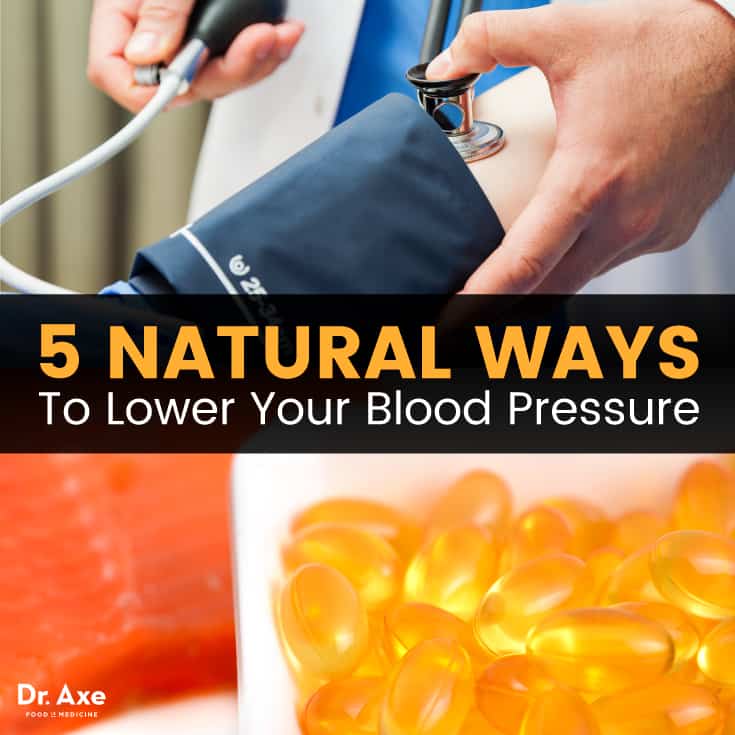
Introduction
High blood pressure, also known as hypertension, affects millions of people worldwide. It is often referred to as a 'silent killer' as it has no obvious symptoms. High diastolic blood pressure can be particularly concerning, as it is associated with an increased risk of heart disease and stroke. In this article, we will explore natural ways to reduce diastolic pressure without relying on medication.
Eat a Healthy Diet

One of the most effective ways to reduce diastolic blood pressure is to improve your diet. A diet that is high in fruits, vegetables, whole grains, and lean protein can help to lower blood pressure. Additionally, reducing your sodium intake can also be helpful. Try to limit your sodium intake to less than 2,300 milligrams per day.
Get Regular Exercise

Regular exercise can help to lower blood pressure and improve overall cardiovascular health. Aim to get at least 30 minutes of moderate-intensity exercise, such as brisk walking or cycling, most days of the week. If you are new to exercise, start slowly and gradually build up your activity level.
Meditation and Yoga

Stress is a common contributor to high blood pressure. Meditation and yoga can be effective ways to reduce stress and promote relaxation. Both practices have been shown to help lower blood pressure and improve overall health and well-being.
Quit Smoking

Smoking is a major risk factor for cardiovascular disease, including high blood pressure. Quitting smoking is one of the best things you can do for your health. If you need help quitting, talk to your doctor or consider joining a support group.
Limit Alcohol Intake

Excessive alcohol consumption can raise blood pressure and contribute to other health problems. If you choose to drink, do so in moderation. This means no more than one drink per day for women and no more than two drinks per day for men.
Reduce Stress

Stress can have a significant impact on blood pressure. Finding ways to manage stress, such as through exercise, meditation, or talking to a therapist, can be helpful in reducing blood pressure and improving overall health.
Get Enough Sleep

Lack of sleep can contribute to high blood pressure. Aim to get at least seven hours of sleep each night. If you have trouble sleeping, try establishing a regular sleep routine or talk to your doctor about other strategies for improving sleep.
Take Supplements

Some supplements may help to lower blood pressure. These include magnesium, potassium, and omega-3 fatty acids. However, it is important to talk to your doctor before taking any supplements, as they can interact with medications and have other side effects.
Use Essential Oils

Essential oils, such as lavender and chamomile, can be helpful in reducing stress and promoting relaxation. Additionally, some essential oils, such as peppermint and lemon, have been shown to help lower blood pressure. However, it is important to use essential oils safely and talk to your doctor before using them.
Reduce Caffeine Intake

Caffeine can raise blood pressure in some people. If you are sensitive to caffeine, try reducing your intake or switching to decaf coffee or tea. Additionally, be aware of other sources of caffeine, such as energy drinks and chocolate.
Drink Hibiscus Tea
Hibiscus tea has been shown to have a beneficial effect on blood pressure. Drinking hibiscus tea regularly may help to lower diastolic blood pressure. However, it is important to talk to your doctor before using hibiscus tea, as it can interact with medications.
Eat Dark Chocolate
Dark chocolate contains flavonoids, which have been shown to help lower blood pressure. Eating a moderate amount of dark chocolate each day may help to reduce diastolic blood pressure. However, be sure to choose high-quality dark chocolate with a high percentage of cocoa solids.
Try Acupuncture

Acupuncture is a traditional Chinese medicine practice that involves the insertion of thin needles into specific points on the body. Some studies have shown that acupuncture may help to lower blood pressure. However, more research is needed to fully understand the effects of acupuncture on blood pressure.
Practice Deep Breathing

Deep breathing can help to lower blood pressure and promote relaxation. Try taking slow, deep breaths for a few minutes each day. You can also try practicing deep breathing during meditation or yoga.
Take a Hot Bath

Taking a hot bath can be a relaxing way to lower blood pressure. The warm water can help to promote relaxation and reduce stress. Additionally, soaking in a hot bath may help to dilate blood vessels and improve blood flow.
Reduce Sugar Intake

Consuming too much sugar can contribute to high blood pressure and other health problems. Try to limit your intake of sugary foods and drinks, such as soda and candy. Additionally, be aware of hidden sources of sugar, such as in processed foods.
Drink Beet Juice

Beet juice contains nitrates, which have been shown to help lower blood pressure. Drinking beet juice regularly may help to reduce diastolic blood pressure. However, it is important to talk to your doctor before using beet juice, as it can interact with medications.
Get Enough Potassium

Getting enough potassium in your diet can help to lower blood pressure. Foods that are high in potassium include bananas, avocados, and leafy green vegetables. Additionally, some supplements may also be helpful in increasing potassium levels.
Conclusion
There are many natural ways to reduce diastolic blood pressure without relying on medication. These include eating a healthy diet, getting regular exercise, reducing stress, and getting enough sleep. Additionally, supplements, essential oils, and other natural remedies may also be helpful in reducing blood pressure. Talk to your doctor before trying any new natural remedies, as they can interact with medications and have other side effects.